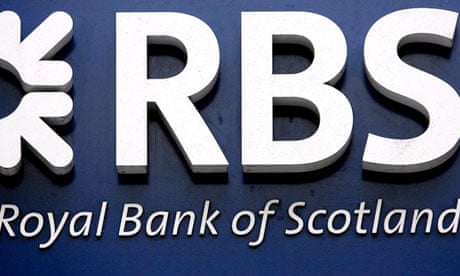A former trader for Royal Bank of Scotland Group has claimed that the bank's internal checks were so lax that anyone could change Libor rates.
More than a dozen banks, including RBS, are under investigation by regulators in the US, Europe and Asia for suspected rigging of the London interbank offered rate (Libor), which is used to price trillions of dollars of financial products.
Barclays was fined £290m in June by American and British authorities for its role in trying to manipulate the interest rates, which affect the cost of borrowing for millions of customers around the world.
Court documents filed in Singapore show that Tan Chi Min, who is suing RBS for wrongful dismissal, claimed that in 2008 a trader for the bank, Will Hall, changed the Libor submission himself even though he was part of the Japanese yen swap desk in London.
The papers show that Tan, who worked for RBS in Singapore, raised the issue at his disciplinary meeting last September, saying that the bank's internal procedure in London seemed to be that "anyone can change Libor".
Tan alleges that the bank's minutes of his disciplinary meeting omitted details of this and other conversations about how traders at the bank tried to influence RBS's interbank lending rate submissions.
He was sacked from his Singapore-based role as head of delta trading for RBS's global banking and markets division in November for trying to improperly influence the bank's rate setters. Delta trading involves using derivatives to mirror the price moves in a basket of securities.
Tan filed a lawsuit against the bank late last year, claiming the practice of traders making requests to the bank's rate setters was well known by RBS management.
RBS is disputing the allegations, saying Tan was dismissed for gross misconduct and that it followed its company disciplinary policy in deciding to terminate his contract. It has already announced that it has sacked several employees for misconduct as a result of its investigations.
Tan is claiming a loss of bonuses from the bank totalling $1.1m (£693,000) and 3.3m RBS shares.
The bank reiterated that it "continues to co-operate fully with ongoing investigations relating to the setting of Libor and other interest rates".
RBS' chief executive, Stephen Hester, has warned that the bank is likely to face fines, like Barclays. RBS is 82% owned by the British taxpayer.
The Libor scandal, which has engulfed the banking industry, led to the resignation of three senior Barclays executives – chief executive Bob Diamond, his former right-hand man Jerry del Missier and chairman Marcus Agius, who was subsequently reinstated to search for a new chief executive.
Barclays has appointed Sir David Walker as chairman from 1 November, when Agius will step down, but is still looking for a replacement for Diamond.
Last week MPs accused Diamond of being "highly selective" in the evidence he gave to their emergency hearings on rigging Libor interest rates. The Treasury select committee also criticised the Bank of England and the Financial Services Authority, the chief City regulator, for not acting sooner: the FSA's investigation of Libor was two years behind the US.
The Bank of England will take over the lead role in banking regulation next year when the FSA is disbanded.
Germany's biggest bank, Deutsche Bank, has also admitted that a "limited number" of its staff were involved in the possible manipulation of Libor rates. HSBC, Citigroup, JP Morgan Chase and UBS are also under investigation.
UK regulators are looking into instituting a reform of the Libor rates are set. Currently, they are compiled from a number of banks submitting their estimate of the price they would need to pay to borrow from other banks over periods ranging from overnight to 12 months, in a range of currencies.





